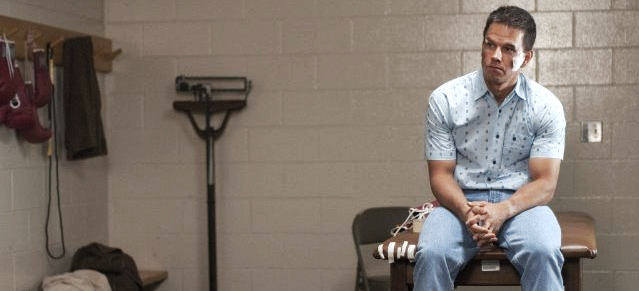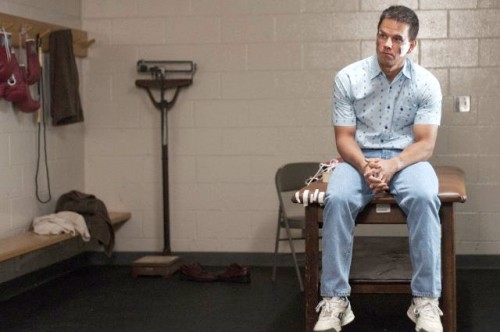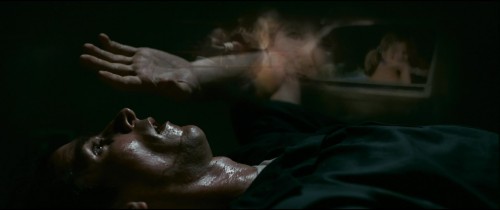
 David Russell, the auteur behind I Heart Huckabees (say what you will!) and Three Kings, obviously has a thing for Mark Wahlberg. I was never a huge fan of the guy, but watching his interview on “Top Gear” recently and viewing The Fighter has made a believer out of me—in all kinds of ways. He’s a talented actor, but most convincingly so when he’s characterizing bits of himself, this penitentiary-proven tough guy or the roughneck Boston bruiser. Especially because these characterizations (ie “bruiser”) don’t resonate with me personally, I assume he’s someone I’m not but wish to be, and his cinematic success tends to bleed a narrative of personal glory. Upon looking closely, though, he’s so good in The Fighter because the story is uniquely his, and it’s not a story-o-glory, but a story of hope rooted in the pit of dysfunction.
David Russell, the auteur behind I Heart Huckabees (say what you will!) and Three Kings, obviously has a thing for Mark Wahlberg. I was never a huge fan of the guy, but watching his interview on “Top Gear” recently and viewing The Fighter has made a believer out of me—in all kinds of ways. He’s a talented actor, but most convincingly so when he’s characterizing bits of himself, this penitentiary-proven tough guy or the roughneck Boston bruiser. Especially because these characterizations (ie “bruiser”) don’t resonate with me personally, I assume he’s someone I’m not but wish to be, and his cinematic success tends to bleed a narrative of personal glory. Upon looking closely, though, he’s so good in The Fighter because the story is uniquely his, and it’s not a story-o-glory, but a story of hope rooted in the pit of dysfunction.
The film spotlights Wahlberg as Micky Ward, a “stepping stone fighter”/boxing hopeful in the Boston suburb of Lowell, managed by his mother and trained by his older brother Dicky (Christian Bale). A profane and glaring profession that we need not open our front door to find our very own “brood of vipers”, Micky’s talent and energy are perpetually frustrated by the well-intentioned but nonetheless infected selfishness of his family. His mother is incompetent and willing to throw Micky under the truck for the sake of a cheap payout. His brother Dicky, stamped around town as “The Pride of Lowell” for his boxing-joke-of-a-past, is a junkie and consistent no-show. As if to cover up the stains of their recidivism, the family’s verbiage is utterly family-prioritizing (“You gonna let her talk like that to your mother?!”), though no one is really willing to admit what’s going on. The pain of family dysfunction is better left untouched, as Dicky’s mother comes to pick him up from his crack den:
[youtube=http://www.youtube.com/watch?v=Ya7fHKVObSo&w=550]
The left hand of grace enters the pit through girlfriend Charlene (Amy Adams), an unlikely, foul-mouthed barmaid trying to get her life sorted, which makes her perfect on a screen already littered with lowlifes. Because she is outside the situation, and can speak objectively to it, she is the revelation Micky needs to see that his current situation is a dead-end. When Dicky is imprisoned for assaulting a cop, his drug addiction is spotlighted on national television, an exposure which brings the entire family providentially to its knees.
The Fighter illustrates how the leveling power of the law is a prerequisite to any forward progress. From there, Micky’s mother is dropped from her position of management, and Micky wins several fights in a row alongside Charlene. Dicky, imprisoned with nowhere to hide, must confront the depths of his addiction and pride. In this particular stage of the film, it seems that the old is out, the new is in, and the new is working. Micky finds new hope in his career through Charlene, and it would appear that the good guys are finally in his corner.
It’s more complicated than that, though, because the “bad guys,” his own family, want to be in his corner, too. Before the big fight, Dicky is released from prison, cleaned up and eager to return to his position as trainer. Charlene, out of both love for Micky and basic common sense, makes Micky promise not to take him back. Micky—for love of his brother and common sense of his own—understands that he needs Dicky in his corner if he’s going to win, just as much as he needs Charlene. Charlene leaves the gym, unable to accept his decision; an understandable if fearful hypocrisy. Though she is a recovering alcoholic, a lowlife bartender, hoping for another chance, she balks at giving second chances to another out of fear that it could ruin her opportunity with Micky.
Regardless of Charlene’s abandonment, Micky’s proclamation of support heals Dicky. Micky imputes to his junkie brother a trusting confidence, compelling Dicky to confront his past and present in a new light. Because he is lovingly accepted, he can live again. In freedom, he bypasses the crackhouse and, in a beautiful picture of repentance, persistently pleads with Charlene to bring her back to Micky’s “corner.” Before they can “make things right,” though, she must see that Dicky is genuine and take him to the heart of his instability—she confronts the very namesake “The Pride of Lowell” that he’s worked so hard to dishonestly maintain. She, too, must meet him in the pit with the acceptance of her own failings.
Their interaction is the climactic moment of the film, rather than the final fight itself, and it’s beautiful. By making the final fight something of a cliche, the scene complicates the narrative arc, making each of the characters “a fighter” – against their pasts and against themselves – with victory only found when one dies to what one has tried to make of oneself. (Profanity warning!)
[youtube=http://www.youtube.com/watch?v=tY_emnRnntY&feature=related&w=550]

COMMENTS
3 responses to “Mockingbird At The Movies: The Fighter”
Leave a Reply














This is lovely. Really makes me want to see the movie now!
Ethan, thank you for this insightful reflection on The Fighter. You’ve highlighted the two primary strands of grace in the film, I think: 1) the wonderful, intervenient force of Charlene’s love in Micky’s life and the way it transforms his whole world from the inside out, and 2) that brilliant scene when Christian Bale goes to her house, which caught me completely off-guard. It was the most moving scene in the whole movie. You make me want to watch it again.
Note: I love when Mockingbird goes to the movies!
+1 – for what John just said!